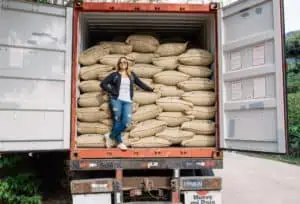Mao Zedong’s famous statement that “women hold up half the sky” became central to the zeitgeist of the Western feminist movement of the 1960s and ‘70s, when identity politics began to foreground the plight of women—economically, socially and politically—both in the U.S. and abroad. Regardless of one’s position on the merits of focusing on gender-based affiliations versus shared values as tools for political change, the fact is that in agriculture, in general, and in coffee production, in particular, women hold up more than half the sky.
The Global Context of Women’s Labor in Coffee
The National Coffee Association (NCA) estimates that women perform up to 70 percent of the labor on coffee farms worldwide, but own, on average, a mere 15% of the land this coffee is grown on. While the disparity is blatant here, the economic and human consequences of that disparity are particularly disturbing when considered in the context of larger gender-related economic issues in agriculture.
Well-documented studies (see the Food and Agricultural Organization of the United Nations [FAO] 2011 report “Women in Agriculture: Closing the Gender Gap for Development”) offer powerful evidence that a gender gap—a disparity in equal access for women to productive resources, markets and services—hinders women’s productivity and dramatically reduces their contributions to the agriculture sector and to the achievement of society’s broader economic and social development goals. The same study estimates that, were the gender gap closed and women as a resource thoroughly integrated into all levels of agriculture, production in developing countries would increase by between 2.5% and 4%, reducing hunger in developing countries by 12%-17%. Closing the gender gap would, the FAO estimates, eliminate hunger for 100-150 million people.
If we extend such analyses to coffee production, it appears that empowering women in coffee not only helps fulfill a fundamental commitment to equal opportunities across genders, but also promises clear and far-reaching economic benefits to coffee-producing societies.
But, as we know, moving toward such empowerment is easier said than done in regions with a long history of male-dominated cultural traditions, women’s lack of access to capital, as well as overt systematic oppression by way of laws that exclude women from controlling property. Cultural assumptions about women’s primary responsibility for childcare, their lack of representation in government and visible leadership roles, and minimal access to education and training all figure prominently in the tangle of conditions that hold women back from achieving greater influence and economic power.
This Month’s Report
Coffee Review has long highlighted the role of farmers in the coffee supply chain, identifying producers by name in our reviews of roasted coffees, whenever possible. Sometimes these producers happen to be women, whether single-family operations, women-led teams, or full-on women’s cooperatives.
We extend and focus that approach here to look specifically at coffees produced by women, and at the women who beat the odds to produce them. We offer this small window into the world of women producers to highlight the value—and the success—of women’s labor in the coffee industry.
The Coffees and Their Farmers
We cupped 47 coffees from women-led producers offered by 34 different roasters. Their scores ranged from 82-95, with an average of 89. A full 25 coffees scored 90 or higher, a testament to the overall quality of these submissions. We review here the top 14, with scores ranging from 92-95. One farmer, Anny Pimentel from El Salvador, has four coffees on this list. Counting the Pimentel coffees, five are from El Salvador, four from Rwanda, one from the Democratic Republic of Congo, one from Colombia, one from Kenya, and two from the U.S. (the Big Island of Hawaii).
Four Coffees from El Salvador’s Anny Ruth Pimentel
Four of the 14 coffees included in this report come from Anny Ruth Pimentel’s Loma La Gloria farm. A second-generation farmer whose father bought this land nearly 20 years ago, Pimentel began working with the farm in 2012 to restore the coffee mill that had been decommissioned during El Salvador’s coffee crisis. Getting the mill back up and running was the first important step in regaining control over quality, ensuring traceability, and allowing her to develop direct-trade relationships with roasters.
In an interview with Coffee Review, Pimentel says, “There are several downsides to being a woman in a male-dominated industry, but I think I’ve gotten respect from my employees by telling my story and getting positive attention for being one of the few women leaders in this industry. I’m like the [coffee variety] Pacamara. People either love me or hate me!”
It turns out that many U.S. roasters fall on the “love” end of the spectrum. The four Pimentel coffees we review here are: Manzanita Roasting’s Bourbon Red Honey (93); Presta’s Natural-Processed Bourbon (93); Old Soul’s Washed Bourbon (92); and West Oak’s Montaña de Abi (92), a special natural lot of Bourbon named after roaster Nick Stevens’ wife, who works in another capacity in the supply chain as the company’s wholesale trainer. Stevens observes that, “Anny Ruth loves to empower and honor women along the coffee chain who are strong, independent, and hard working.”
These four coffees were processed by three different methods: dried-in-the-fruit, or natural; conventional washed; and red honey-processed. The fact that all were successful green coffees, as well as successful when interpreted in a range of roasting styles, is an impressive testimony to Pimentel’s versatility as producer.
When asked if it’s important to specifically identify the work of women in the supply chain, Pimentel replies with an emphatic “yes.” “More women need to be aware that it’s possible to succeed, so we all need inspirational stories from other women. And we all need to learn from each other,” she urges. Does she think there are any hidden advantages to being a woman in this industry? In fact, she does: “I think that, just as in any other industry and in life itself, it’s all about finding the way to turn something negative to positive and make the most of what you think is not that advantageous.” Pimentel attributes her success, in large part, to the support of her father, who mentored her when she was new to coffee and put his trust in her abilities.
Aida Batlle, Coffee-Growing’s First Female Celebrity
Another farmer from El Salvador, Aida Batlle, says she faces more challenges as a farmer, in general, than as a woman farmer. This is, perhaps, because she experienced such dramatic early success as coffee producer. Since her entry onto the world coffee stage in 2003, when she wowed judges at El Salvador’s first Cup of Excellence competition with a coffee from her Finca Kilimanjaro farm that garnered $14.06 a pound (El Salvador coffee at that time averaged under $1 per pound), she has become one of the most highly regarded producers anywhere, male or female. Batlle’s success was further amplified by a long profile about her life and work featured in the New Yorker magazine in 2011.
We review Batlle’s Cascara Fermentation Finca Kilimanjaro here, roasted by PT’s Coffee, at a score of 95, the top-scorer in this month’s report. In addition to her prodigious talents in coffee-farming and marketing, Batlle has shown a willingness to experiment with tradition, as she’s done with the coffee fermented with cascara (the husks of dried coffee fruit) we review here. It’s important to note that much of Batlle’s freedom to innovate comes from the fact of her land ownership, which gives her command of her own destiny, a story that is rarer than it should be among women coffee farmers.
When asked what advice she would give other women hoping to find success in coffee, she replied, “Don’t listen to anyone who tells you you can’t do it. Just keep kicking ass.”
Central to her success is an understanding that her own taste preferences are secondary to the expectations of the market and the possibilities inherent in different coffee styles and methods. She says, “When I started all the crazy fermentation experiments, I knew I had to honor the full potential of each coffee. Not to do so would be like owning an ice cream shop and not carrying pistachio ice cream, just because I don’t like it.” This is Batlle’s fourth year working with the cascara fermentation method, which has resulted in a coffee that’s intense, fruit-toned, and rife with notes of pungent frankincense and dark chocolate.
Two Unique Coffees at a Score of 94
Coming in at 94 are two coffees, a Hawaii and a Colombia, each different from the other, yet both unique. One is Big Island Coffee Roasters’ Puna Natural, one of two examples in our report from companies that both produce and roast their coffees. Kelleigh Stewart, who is a newly minted Q-grader and, with her husband Brandon von Dimitz, owns and operates this farm in the emerging Puna District of the Big Island of Hawaii, resists lamenting the status of women in coffee, given her own relative privilege as a farm owner with access to training and capital. Still, she’s had to resist the gender stereotypes she grew up with and that she encounters first-hand in Hawaii’s rural farming community. She says the most common challenge she faces is men “asking to see ‘the man of the house’; many would rather leave than speak with a woman. Perhaps some [women] would become discouraged, but the discrimination tends to motivate me to become more, and fight for those who can’t.”

Big Island Coffee’s natural-processed Puna on the right, contrasted with fresh-picked cherries. Courtesy of Kelleigh Stewart.
Stewart and von Dimitz’s coffee is comprised of Caturra, Pache, Bourbon and Typicavarieties of Arabica and displays notes of apricot, lime zest, a spicy floral akin to lavender, and savory herb that suggests thyme.
Also at 94 is a coffee from the celebrated Gesha variety from producer La Palma Y El Tucán in the Cundinamarca Department of Colombia, roasted by San Diego’s Bird Rock Coffee. Elisa Maria Madriñàn is co-founder of La Palma Y El Tucán and a leader in the “new Colombia” movement. Madriñàn’s farm runs a very successful program called Neighbors & Crops that provides training and resources to more than 200 farmers in the region and processes their coffee at La Palma Y El Tucán’s state-of-the-art wet mill. We recently reviewed, at an impressive 94, a coffee in this program produced by Olga Beltran and roasted as espresso by Caesar Tu of Taiwan’s Kakalove Café.
The Palma Y El Tucán Gesha included in this report is a small-production estate coffee that is as coddled as any vintage wine, displaying a striking version of the Gesha profile, delicate but almost disconcertingly original in aroma and flavor.
Madriñàn reflects on the challenges of being a woman producer, sharing that, “Being a woman coffee farmer, or performing any of the farm´s daily activities as a woman, is a constant challenge in Colombia´s agricultural context. Most agricultural activities (from owning the land to working it, as well as processing food) are strongly associated with a culturally embedded macho supremacy, and this makes it hard for women who work the land to get the recognition they deserve.”
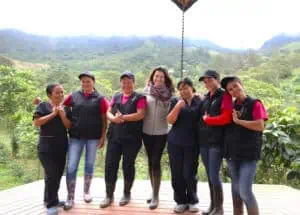
Elisa Madriñan (center), co-founder of of La Palma Y El Tucán with her all-women crew of elite pickers. Courtesy of La Palma Y El Tucán
Two years ago, Madriñàn launched a program designed to train pickers to work on their elite cherry-picking team, who would be responsible for selecting only the best cherries from their varietal lots with the utmost care and attention to detail. The six women on this team picked the Gesha reviewed in this report. Madriñàn encourages them, and all women in the industry, to “keep fighting against the ‘macho’ doctrines that are established in most of the coffee-producing countries, and do it with passion and love.”
Five Solid 93-Scoring Coffees
We also turned up an abundance of solid 93-scoring coffees. In addition to the two Loma La Gloria coffees mentioned above, we review a Seattle Coffee Works Kenya Nyeri Kiamaina Peaberry and two Rwanda cooperative coffees, Question Coffee’s Twongere Umusaruro and Texas Traders’ Nyampinga.
The Kenya Nyeri Kiamaina Cooperative is led by Jane Mahinda and Purity Wanjiku, by all accounts a fierce team at the helm of the 600-member coop.
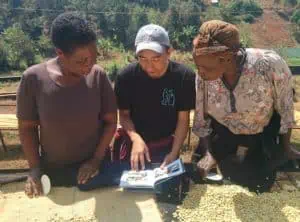
From left to right, Jane Mahinda, Oscar Garcia (a green buyer for Seattle Coffee Works), and Purity Wanjiku. Courtesy of Seattle Coffee Works.
Two beautiful Rwandas also scored 93, one submitted by Question Coffee and the other by Texas Traders. While these two green coffees are rather similar overall, they were developed with somewhat different roast profiles, giving them very different, but equally attractive, appeals. Both are from cooperatives working with Sustainable Harvest Rwanda, which partnered with Bloomberg Philanthropies to help Rwandan women develop their coffee farms by deepening their training in agronomy and quality-control. Out of this work came “premium sharing rewards,” which is, explains Sustainable Harvest founder David Griswold, “a program that examines the many needs of local farmers to identify what tools small-scale farmers need as well as what training and skills they seek to help improve their agricultural production. Farmers accrue ‘rewards points’ over time by following good coffee farming practices, producing high-quality goods and being active participants in their cooperatives. These points can be used to acquire tools, like pruning shears, or other goods, like mobile phones and solar lights.”
The Question Coffee Twongere Umusaruro, one of the Sustainable Harvest program’s “relationship coffees,” a joint project with The Relationship Coffee Institute, is rich-toned and sweetly savory, with notes of violet, peach and pistachio. The Texas Traders’ Nyampinga is a bit darker-roasted, developing deep chocolate tones, along with peppery spice notes and a hint of smoky aromatic wood.
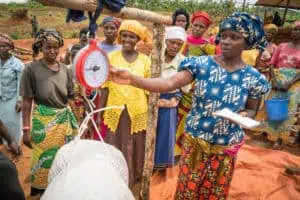
Farmers of the Twongere Umusaruro Cooperative in Rwanda weigh their crop. Courtesy of Sustainable Harvest.
Agnes Ninawumuntu, a member of the Twongere Umusaruro cooperative says, “Question Coffee has made me proud to be a coffee professional. Seeing and tasting my coffee in that bag, I now understand the entire value chain. Before, I had never even tasted my own coffee. The training and support the Relationship Coffee Institute has provided us has improved our entire community’s specialty coffee. The access to new markets for our coffees has more than doubled our incomes.”
A Congo, Two More Rwanda Cooperative Coffees, and a Hawaii Farmer-Roaster
The respectable 92-scoring group of coffees, in addition to the two Loma La Gloria coffees noted above, include an Allegro Coffee Roasters Congo Muungano; two more Rwandas, one a Nyampinga Cooperative coffee (from women-owned Equator Coffees and Teas), and the other a Jarama Rwanda produced by Furaha Umwizeye and submitted by Amavida Coffee and Tea. Umwizeye is a woman-farmer who owns three farms in Rwanda and employs 140 workers at Jarama, alone.
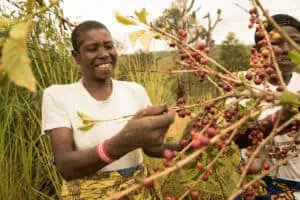
Members of the Nyampinga Cooperative in Rwanda pick coffee cherries. Courtesy of Sustainable Harvest
The Congo cooperative, the name for which, Muungnano, means “togetherness,” counts women as one-third of its membership. And the majority of these women are their families’ sole breadwinners, their husbands having been killed in the most recent Congo civil war, the Kivu Conflict of 2004-2013. Through a partnership with Gender Action Learning Systems (GALS), women and men work together to understand and rectify gender inequities, empowering women both at home and in the coffee business. This is also a Fair Trade-certified coffee, meaning it was purchased from small-holding farmers at a “fair” or economically sustainable price. Fair Trade USA [http://fairtradeusa.org/ ] is an umbrella organization that certifies coffee (and other products) as fair trade, guaranteeing farmers a minimum price for their coffee and connecting them with importers.
Rounding out the list is Lorie Obra’s Ka’u Natural from the Big Island of Hawaii’s Ka’u growing district 30 miles southeast of the famous Kona region. Along with Kelleigh Stewart, mentioned above, Obra represents an unusual combination of farmer/roaster. She took on the coffee farm when her husband Rusty died, and she spoke with us about the challenges she faced. “When Rusty died, it was just the two of us working the farm, wet mill and roastery. Everyone wondered if I could manage all of this and handle the manual labor as a woman. Before he died, my husband told me to give up the farm because he thought it would be too much for me. I kept all of it going because I wanted to fulfill Rusty’s dream of making Ka’u coffee some of the best in the world. It wasn’t easy.” But it was successful. Obra’s coffee (both green and roasted) has since won numerous awards within Hawaii, the greater U.S., and internationally.
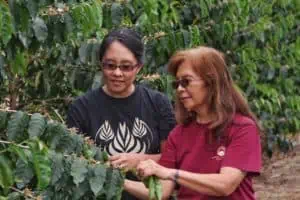
Lorie Obra (right) of Rusty’s Hawaiian, with her daughter Joan on their Ka’u farm on the BIg Island of Hawaii. Courtesy of Rusty’s Hawaiian.
When asked whether women’s work in the supply chain should be specifically noted, Obra’s daughter, Joan, replied, “Increasing awareness of women’s work in coffee is just the first step. To take it further, we should ask ourselves: What opportunities result from this recognition? Does it encourage female entrepreneurship? Does it allow women to be mentored and to advance in companies? Does it result in equal pay for equal work on par with men? All of these are good goals.”
Roaster Partners
We posed one central question to all the roasters whose coffees we review in this report: Do you consciously source women-produced coffees? The answers were as various as the coffees, ranging from coincidence to outright intention.
Jeff Taylor, of PT’s and Bird Rock, says, “We never source specifically from male or female producers, to be honest. Our focus is always on the coffee with the most clarity. It just seems we’ve been finding some really nice coffees from women producers. Aida (Batlle) has been a producing partner of ours for 10-plus years. We truly value her professionalism, skill and friendship.”
Samantha Nawrocki, co-owner of Manzanita Roasting Company, has a more directly political approach to sourcing: “We’re excited to see successful women coffee-growers in Central America, like Anny Ruth Pimentel at Loma La Gloria farm, producing high-quality beans. We think it’s important, from the grower to the pickers to the villages they support, to support the upward mobility of women and children in an industry that’s had gender constraints for generations. Helping women and children gain access to education, healthcare and clean water are also important in this equation, when we consider working with a farm in a direct-trade relationship. We may pay a bit more for beans, but it’s really about the bigger picture, too.”
Old Soul’s Sacramento-based Jason Griest recounts his visit to Pimentel’s farm: “We were so blown away by Anny’s dynamic personality, cutting-edge farm techniques, and how she treated all of her employees, that we bought a whole day’s worth of pickings. After three levels of sorting out only the best of the best cherries, we had 12 bags. We asked Anny to take it a step further and process our lot in three different ways. She obliged, and we have a washed-process, a red honey and a natural, that span the flavor wheel — and, most importantly, an amazing farmer and friend whom we’ll work with for many years to come. As Anny says, ‘The future is female!’”
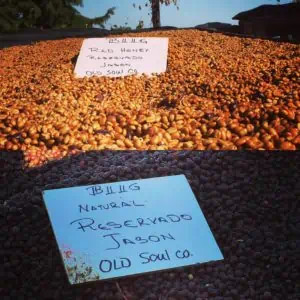
Two of Old Soul’s lots at Loma La Gloria, Anny Ruth Pimentel’s farm in El Salvador. Courtesy of Old Soul Co.
Texas Traders’ co-owner Beth Beall also answers the gender-focus question in the affirmative, elaborating that, “Of the 25 million coffee farmers in the world, the majority of these people are women. They may not hold the titles of the land, but they are often the ones planting, tending and harvesting. Where the disconnect happens is … who actually gets paid for the product.” She goes on to say that, “As a woman who owns a business, the inequality of this practice bothers me. One of the reasons we take time to look for coffees from women producers is to help correct this pattern.”
Amavida’s director of development Martin Trejo explains the evolution of their specific relationship to the Rwanda project. He says, “The Lake Kivu area that borders Rwanda and the Democratic Republic of Congo has some of the highest altitudes and most fertile soils of either country. Historically, it has been a very hard place to access coffee due to civil war, corruption and lack of economic support. Moreover, it is a very hard place to be a woman. Amavida has worked specifically in the Lake Kivu region to support women’s empowerment groups through our non-profit partner On the Ground Global (OTG), which facilitates GALS (see above) courses that help communities develop sustainability and resilience through economic inclusivity and the rejection of violence.”
Resources and Further Reading
A number of organizations are active and gaining momentum in supporting women in coffee-production.
The mission of the International Women’s Coffee Alliance (IWCA) is centered around forming networks of self-governing chapters across the globe that connect women across the entire supply chain. To date, IWCA has 21 official chapters across all coffee-producing continents.
Bloomberg Philanthropies has partnered with Sustainable Harvest to create the Relationship Coffee Alliance whose mission is to work with women coffee farmers in Rwanda to increase production, improve quality, and build their domestic market.
The Café Femenino Foundation, founded in 2004, works within existing socioeconomic structures to create positive change in the lives of women coffee farmers.
Finally, the Specialty Coffee Association of America (SCAA) published a white paper in 2015 entitled A Blueprint for Gender Equality in the Coffeelands which analyzes broad agricultural data in developing countries and infers outcomes for coffee-producing countries specifically.











